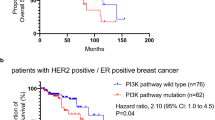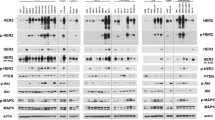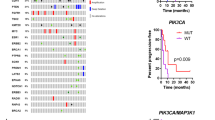Abstract
Human epidermal growth factor receptor-2 (HER2) amplification/overexpression (HER2+) frequently co-occurs with PI3K pathway activation in breast tumors. PI3K signaling is most often activated by PIK3CA mutation or PTEN loss, which frequently results in sensitivity to p110α or p110β inhibitors, respectively. To examine the p110 isoform dependence in HER2+, PTEN-deficient tumors, we generated genetic mouse models of breast tumors driven by concurrent Her2 activation and Pten loss coupled with deletion of p110α or p110β. Ablation of p110α, but not p110β, significantly impaired the development of Her2+/Pten-null tumors in mice. We further show that p110α primarily mediates oncogenic signaling in HER2+/PTEN-deficient human cancers while p110β conditionally mediates PI3K/AKT signaling only upon HER2 inhibition. Combined HER2 and p110α inhibition effectively reduced PI3K/AKT signaling and growth of cancer cells both in vitro and in vivo. Addition of the p110β inhibitor to dual HER2 and p110α inhibition induced tumor regression in a xenograft model of HER2+/PTEN-deficient human cancers. Together, our data suggest that combined inhibition of HER2 and p110α/β may serve as a potent and durable therapeutic regimen for the treatment of HER2+, PTEN-deficient breast tumors.
This is a preview of subscription content, access via your institution
Access options
Subscribe to this journal
Receive 50 print issues and online access
$259.00 per year
only $5.18 per issue
Buy this article
- Purchase on Springer Link
- Instant access to full article PDF
Prices may be subject to local taxes which are calculated during checkout



Similar content being viewed by others
References
Hynes NE, Lane HA . ERBB receptors and cancer: the complexity of targeted inhibitors. Nat Rev Cancer 2005; 5: 341–354.
Blackwell KL, Burstein HJ, Storniolo AM, Rugo H, Sledge G, Koehler M et al. Randomized study of Lapatinib alone or in combination with trastuzumab in women with ErbB2-positive, trastuzumab-refractory metastatic breast cancer. J Clin Oncol 2010; 28: 1124–1130.
Hudis CA . Trastuzumab—mechanism of action and use in clinical practice. N Engl J Med 2007; 357: 39–51.
Vanhaesebroeck B, Guillermet-Guibert J, Graupera M, Bilanges B . The emerging mechanisms of isoform-specific PI3K signalling. Nat Rev Mol Cell Biol 2010; 11: 329–341.
Zhao JJ, Cheng H, Jia S, Wang L, Gjoerup OV, Mikami A et al. The p110alpha isoform of PI3K is essential for proper growth factor signaling and oncogenic transformation. Proc Natl Acad Sci USA 2006; 103: 16296–16300.
Graupera M, Guillermet-Guibert J, Foukas LC, Phng LK, Cain RJ, Salpekar A et al. Angiogenesis selectively requires the p110alpha isoform of PI3K to control endothelial cell migration. Nature 2008; 453: 662–666.
Utermark T, Rao T, Cheng H, Wang Q, Lee SH, Wang ZC et al. The p110alpha and p110beta isoforms of PI3K play divergent roles in mammary gland development and tumorigenesis. Genes Dev 2012; 26: 1573–1586.
Guillermet-Guibert J, Bjorklof K, Salpekar A, Gonella C, Ramadani F, Bilancio A et al. The p110beta isoform of phosphoinositide 3-kinase signals downstream of G protein-coupled receptors and is functionally redundant with p110gamma. Proc Natl Acad Sci USA 2008; 105: 8292–8297.
Jia S, Liu Z, Zhang S, Liu P, Zhang L, Lee SH et al. Essential roles of PI(3)K-p110beta in cell growth, metabolism and tumorigenesis. Nature 2008; 454: 776–779.
Yuan TL, Cantley LC . PI3K pathway alterations in cancer: variations on a theme. Oncogene 2008; 27: 5497–5510.
Stemke-Hale K, Gonzalez-Angulo AM, Lluch A, Neve RM, Kuo WL, Davies M et al. An integrative genomic and proteomic analysis of PIK3CA, PTEN, and AKT mutations in breast cancer. Cancer Res 2008; 68: 6084–6091.
Saal LH, Holm K, Maurer M, Memeo L, Su T, Wang X et al. PIK3CA mutations correlate with hormone receptors, node metastasis, and ERBB2, and are mutually exclusive with PTEN loss in human breast carcinoma. Cancer Res 2005; 65: 2554–2559.
Hanker AB, Pfefferle AD, Balko JM, Kuba MG, Young CD, Sanchez V et al. Mutant PIK3CA accelerates HER2-driven transgenic mammary tumors and induces resistance to combinations of anti-HER2 therapies. Proc Natl Acad Sci USA 2013; 110: 14372–14377.
Nagata Y, Lan KH, Zhou X, Tan M, Esteva FJ, Sahin AA et al. PTEN activation contributes to tumor inhibition by trastuzumab, and loss of PTEN predicts trastuzumab resistance in patients. Cancer Cell 2004; 6: 117–127.
Eichhorn PJ, Gili M, Scaltriti M, Serra V, Guzman M, Nijkamp W et al. Phosphatidylinositol 3-kinase hyperactivation results in lapatinib resistance that is reversed by the mTOR/phosphatidylinositol 3-kinase inhibitor NVP-BEZ235. Cancer Res 2008; 68: 9221–9230.
Esteva FJ, Guo H, Zhang S, Santa-Maria C, Stone S, Lanchbury JS et al. PTEN, PIK3CA, p-AKT, and p-p70S6K status: association with trastuzumab response and survival in patients with HER2-positive metastatic breast cancer. Am J Pathol 2010; 177: 1647–1656.
Vanhaesebroeck B, Khwaja A . PI3Kdelta inhibition hits a sensitive spot in B cell malignancies. Cancer Cell 2014; 25: 269–271.
Fruman DA, Rommel C . PI3K and cancer: lessons, challenges and opportunities. Nat Rev Drug Discov 2014; 13: 140–156.
Wee S, Wiederschain D, Maira SM, Loo A, Miller C, deBeaumont R et al. PTEN-deficient cancers depend on PIK3CB. Proc Natl Acad Sci USA 2008; 105: 13057–13062.
Schade B, Rao T, Dourdin N, Lesurf R, Hallett M, Cardiff RD et al. PTEN deficiency in a luminal ErbB-2 mouse model results in dramatic acceleration of mammary tumorigenesis and metastasis. J Biol Chem 2009; 284: 19018–19026.
Costa C, Ebi H, Martini M, Beausoleil SA, Faber AC, Jakubik CT et al. Measurement of PIP3 levels reveals an unexpected role for p110beta in early adaptive responses to p110alpha-specific inhibitors in luminal breast cancer. Cancer Cell 2015; 27: 97–108.
Schwartz S, Wongvipat J, Trigwell CB, Hancox U, Carver BS, Rodrik-Outmezguine V et al. Feedback suppression of PI3Kalpha signaling in PTEN-mutated tumors is relieved by selective inhibition of PI3Kbeta. Cancer Cell 2015; 27: 109–122.
Schmit F, Utermark T, Zhang S, Wang Q, Von T, Roberts TM et al. PI3K isoform dependence of PTEN-deficient tumors can be altered by the genetic context. Proc Natl Acad Sci USA 2014; 111: 6395–6400.
Juric D, Krop I, Ramanathan R, Xiao J, Sanabria S, Wilson T et al. Lbstract LB_64: GDC-0032, a beta isoform-sparing PI3K inhibitor: results of a first-in-human phase 1a dose escalation study. Cancer Res 2013; 73: 6.
Juric D, Rodon J, Gonzalez-Angulo A, Burris H, Bendell J, Berlin J et al. Abstract CT-01: BYL719, a next generation PI3K alpha specific inhibitor: Preliminary safety, PK, and efficacy results from the first-in-human study. Cancer Res 2012; 72: 6.
Ursini-Siegel J, Hardy WR, Zuo D, Lam SH, Sanguin-Gendreau V, Cardiff RD et al. ShcA signalling is essential for tumour progression in mouse models of human breast cancer. EMBO J 2008; 27: 910–920.
Lesche R, Groszer M, Gao J, Wang Y, Messing A, Sun H et al. Cre/loxP-mediated inactivation of the murine Pten tumor suppressor gene. Genesis 2002; 32: 148–149.
Acknowledgements
We thank Dr Roderick Bronson and the Dana-Farber/Harvard Cancer Center Rodent Histopathology Core for histopathological analyses. MMTV-NIC mice were provided by W Muller (McGill University). Floxed Pten mice were provided by H Wu (UCLA). This work was supported by start-up fund from Department of Pathology and Laboratory Medicine, Medical University of South Carolina (QW), the Susan G. Komen Breast Cancer Foundation CCR 12225834 (IEK), the Breast Cancer Research Foundation (NUL, EPW, JJZ), NIH grants CA187918 (TMR and JJZ), CA172461-01 (JJZ) and 1P50CA168504 (TMR, IEK, EPW, NUL and JJZ).
Author information
Authors and Affiliations
Corresponding author
Ethics declarations
Competing interests
TMR is a consultant of Novartis and has received a research grant from Novartis. EPW has received research grants from Genentech and Roche. IEK is a consultant of Amgen and has received research funding from Genentech. NUL has received research grants from Genentech, Array Biopharma, GlaxoSmithKline, Kadmon and Novartis. The remaining authors declare no competing financial interest.
Additional information
Supplementary Information accompanies this paper on the Oncogene website
Rights and permissions
About this article
Cite this article
Wang, Q., Liu, P., Spangle, J. et al. PI3K-p110α mediates resistance to HER2-targeted therapy in HER2+, PTEN-deficient breast cancers. Oncogene 35, 3607–3612 (2016). https://doi.org/10.1038/onc.2015.406
Received:
Revised:
Accepted:
Published:
Issue Date:
DOI: https://doi.org/10.1038/onc.2015.406
This article is cited by
-
Inhibition of PI3K Signaling Intensified the Antileukemic Effects of Pioglitazone: New Insight into the Application of PPARγ Stimulators in Acute Lymphoblastic Leukemia
Indian Journal of Hematology and Blood Transfusion (2023)
-
Signaling pathways and therapeutic interventions in gastric cancer
Signal Transduction and Targeted Therapy (2022)
-
Understanding and overcoming tumor heterogeneity in metastatic breast cancer treatment
Nature Cancer (2021)
-
The role of HER2 and HER3 in HER2-amplified cancers beyond breast cancers
Scientific Reports (2021)
-
Safety and Tolerability of Phosphatidylinositol-3-Kinase (PI3K) Inhibitors in Oncology
Drug Safety (2019)



